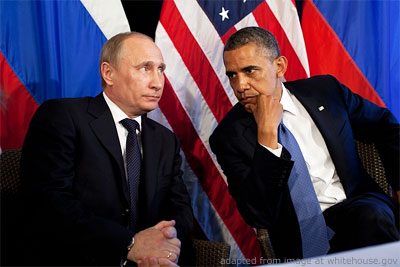Growing pessimism over Russia-U.S. relations creates fears of Cold War 2.0

(Russia Beyond the Headlines – rbth.ru – Andrei Ilyashenko, special to RBTH – December 11, 2014)
Twenty-five years ago, at a meeting in Malta, Soviet leader Mikhail Gorbachev and his American counterpart George Bush, Sr. proclaimed the end of the Cold War. Now, a quarter century later, Russian politicians and experts are raising the alarm that the world might soon enter another Cold War.
“I’m not ready to say whether this is a new edition of the Cold War or how long this period will last,” Russian Deputy Foreign Minister Sergei Ryabkov, one of the overseers of the country’s America policy, said on Dec. 8 during parliamentary hearings at the State Duma. Fittingly, the topic of the hearings was “Russia-U.S.: Temporary Flare-Up or a New Cold War?”
“But it will take many years to emerge from the situation with the American sanctions,” Ryabkov continued. According to him, “relations started to seesaw long before Ukraine, and through no fault of Russia’s” because “the desire to tear the CIS countries away from Russia has always been an American foreign policy priority.” Now, the deputy foreign minister said, “the declared goal of forcing us to change our position on Ukraine barely conceals the aim of forming the socio-economic conditions for regime change in Russia.”
Based on Ryabkov’s last statement, it can be assumed that Moscow views the United States’ current anti-Russian line as aggressive. The deputy foreign minister is probably using more diplomatic phrases in order to avoid the term “Cold War,” which carries dangerous connotations. After all, things are a little different militarily this time around.
Military experts and political analysts in solidarity
The Cold War between Russia and the U.S. isn’t over, General Yury Baluyevsky, former general chief of staff of the Russian Armed Forces, said at a recent meeting of the Analysis expert discussion club in Moscow. “The Cold War was, is, and will continue. All that has changed is the way war is waged. Now it is more sophisticated,” Baluyevsky said. His statements seem to forecast a military conflict between the two world powers.
“Today, the U.S. and NATO armed forces are generally ‘homed in’ on combat with Russia. Tomorrow and in the future, they will focus on combat with China. They don’t see any other enemies. Is an armed conflict possible with Russia today? Unfortunately, in my view, yes, it’s possible. It is possible if several conditions are met,” Baluyevsky said.
Those conditions include “a profound crisis in the Russian economy, a weakened power vertical, growth in anti-government feeling and other dissent in society, a continued decline in the military capabilities of the armed forces, and most importantly, of the general purpose forces, as well as a loss of restraint on the part of the nuclear powers,” he continued.
Political analysts voiced similarly pessimistic predictions.
Relations between the West and Russia are at their worst in 30 years, said Sergei Rogov, director of the Institute for U.S. and Canada Studies at the Russian Academy of Sciences. “And a situation has arisen that could give rise to a Cold War.
Right now it’s just cold peace,” he said at a meeting of the Russian Academy of Sciences presidium. “But there can’t be a literal repeat of the Cold War. This isn’t a collision between two systems, there is no socialist camp. There is no bipolarity, either,” he said.
Politicians and officials prepare for conflict
State Duma deputies are more sure about the situation. “Sad as it may be, we have entered a Cold War,” First Deputy Chairman of the State Duma Committee on International Affairs Leonid Kalashnikov said. In his opinion, the Cold War of the 20th century stemmed from an irreconcilable ideological confrontation between the U.S. and the Soviet Union. This time around, however, ideology is not the issue.
The current problem is rooted in geopolitical confrontation, contradictory assessments of the role the U.S. plays on the world stage, and the commitment to liberalism in the U.S. and to conservatism in Russia, not so much in economic terms as in terms of family and religion. “The world has become less stable than it was during the Cold War,” Kalashnikov said.
The Russian Foreign Ministry’s forecasts provide no consolation. Resolution 758, recently passed by the U.S. House of Representatives, which strongly condemns Russian “aggression against neighboring countries, aimed at political and economic domination,” among other things, “gives cause for concern,” Deputy Foreign Minister Ryabkov said.
“I won’t rule anything out. Things could get even more complicated. We’ll do everything we can to stabilize relations with the U.S. and find a reasonable, durable basis for them. But unfortunately, the resolution adopted in the House of Representatives is sort of a barometer of a completely different sentiment in the U.S.,” Ryabkov said.
Article also appeared at rbth.com/international/2014/12/11/growing_pessimism_over_russia-us_relations_creates_fears_of_col_42159.html
